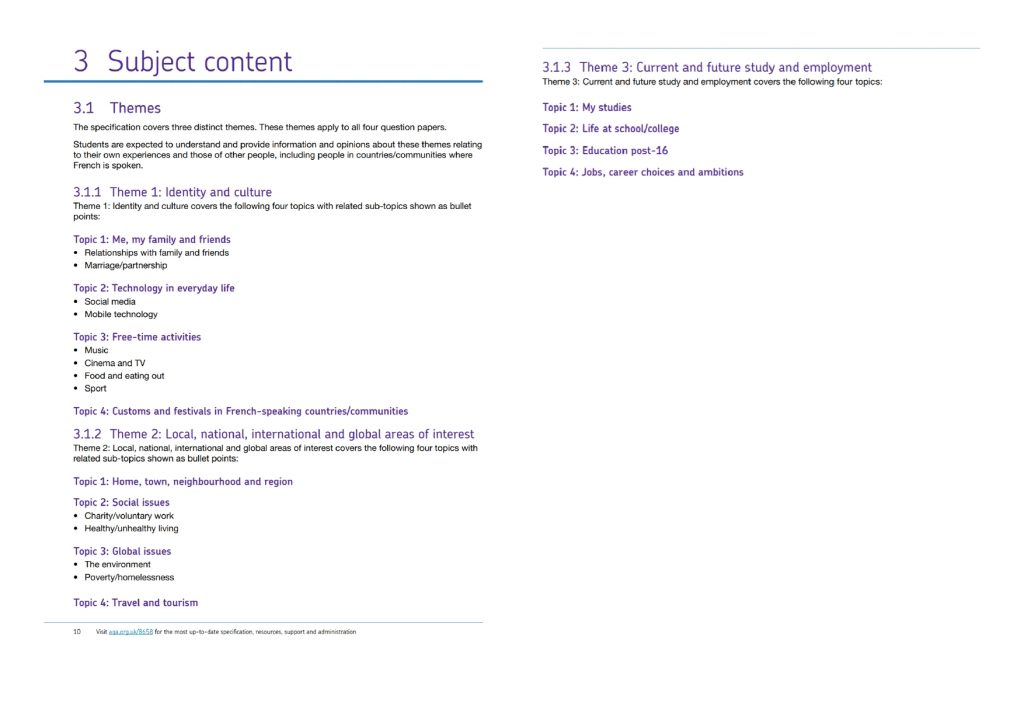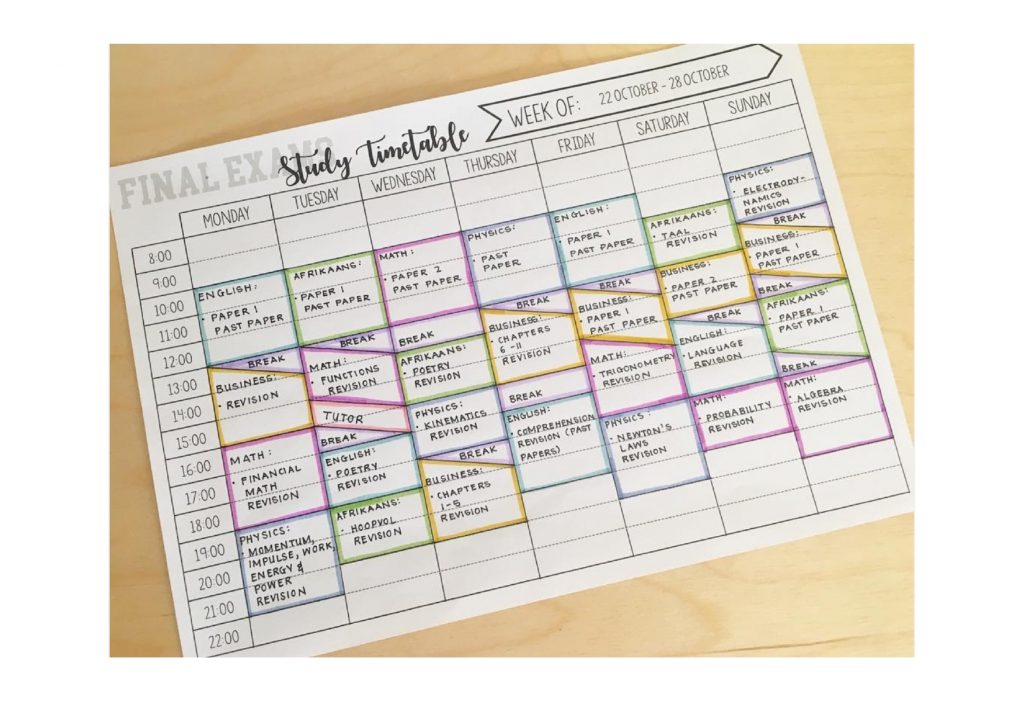 Relax, I’ve got ages until my exams…! Sound familiar?
Relax, I’ve got ages until my exams…! Sound familiar?
Why Do I Need Last-Minute Revision Tips for Language Exams? See meme!
My Last Minute Revision Story
As a student taking my French and German GCSE and French and German A-Level exams between 2003-2005, I used to put revision off until the very last minute. More often than not, until the week before my exams. This is when I, rightly so, started panicking. Obviously, as a teacher, I don’t advocate leaving revision until the last minute, as it really should be an ongoing process. However, I know many students who end up in the same situation as I did. Therefore, I’d be a complete hypocrite to judge anyone else leaving their revision to the last minute! With last minute revision ‘do-ers’ in mind, I wanted to put together some ideas to help reduce anxiety and maximise the revision time that is left if you have left it a bit late. This post is for those who could use some tips on how to most effectively for their language exams at the last minute. These tips are, of course, adaptable to other exams too.
Disclaimer: Please note that these last-minute revision tips for language exams may or may not be scientifically proven and may/may not be research backed. They are tips that I have used and which have helped my own exam groups and students to feel the most prepared and confident they can upon having left their revision until the last minute. The revision tips below have also helped many students to achieve the grades they wanted, hence sharing them with you!
Where Do I Start?
1. Focus
So you’ve left your revision to the month, week or day before your exam. Don’t throw the towel in yet, as it’s always possible to learn something in whatever time you have available. Don’t fixate on what you can’t do, focus on what you can do.
2. Avoid Distractions
Time is ticking, you’re ready to focus on what you can do. Now, find a quiet and tidy place to work and put your phone / smart watch and any other distracting devices in another room, so you aren’t tempted to have a quick look on Instagram, Tik Tok etc etc.
3. Use The Exam Specification
a) Download a copy of your exam specification on to your laptop / PC
You can usually find it by typing in your exam board, course name and level + specification into Google. This document is your friend and has most of the information you need to succeed. But, don’t worry, you don’t have to read every page!
These are the current specifications for AQA Language GCSEs (current in March 2020). You might be using another exam board so check with your teachers if you are unsure to find the right one for your language revision.
AQA French GCSE Specification
AQA German GCSE Specification
AQA Spanish GCSE Specification
 b) Identify The Important Topic Components
b) Identify The Important Topic Components
…by creating a rough plan of the topics you need to cover. You can do this by checking your course’s specification for ‘subject content’ and finding the themes/topics you need to cover. For AQA French GCSE, this can be found on pages 9 and 10 of the 2016 specification.
c) Understand and Highlight The Assessment Objectives and Criteria
This can also be found in the course’s specification. Please note: this section might take a bit of time. However, I feel that is is time very well spent. Especially since, “exams are not a test of memory, but a test of understanding” (Evans, 2001) If you understand what is expected of you, then you can ensure the rest of your revision is focused around doing what you can to meet those expectations. If you are studying French AQA GCSE, then this can be found from pages 68-90.
 4. Create a Plan
4. Create a Plan
Organising your revision properly can ease worries and help you to achieve a great result. The key here though is to be realistic. You will have less free time temporarily, but remember there is still time. Realistically draw out a time table that you can actually stick to and remember to allow time for tea breaks, phone breaks, loo breaks and lunch breaks. However, simply writing ‘French’ or ‘German’ into your schedule won’t suffice.
Ideally, you should be breaking your subjects down further into topics, to ensure you cover each one. Divide the number of topics in the course by the number of realistic sessions you can dedicate to your language. I really mean it! If you aren’t realistic about the time you can spend studying your language and if you don’t be specific in the topics you need to work on each session, you will become frustrated, discouraged and probably more stressed. So, if you can only dedicate 5 revision sessions and there are 10 topics, you will need to try and cover 2 subjects per revision session. To give you an idea, the French AQA GCSE specification has 12 topics spanning 3 themes. You can find these topics under: ‘themes’ on your course’s specification.
5. Find and Organise Course Material and Notes
Think about revision in a wider sense, not simply absorbing facts. By that, I mean that you can’t just read your course books or notes and expect to learn or for it to stay in your brain. You need to use a variety of revision materials and do ‘active’ revision:
Revision materials for language exams could include:
- course texts
- your own notes
- past exam papers
- practice papers
- potential topics and questions
- handouts from your lessons
What is Active Revision?
a) ORGANISE
the material in a structured form on a page or in booklet form, using the exam criteria to ensure you have all information needed.
b) SELECT
only the most necessary parts of information to answer speaking / writing questions in your text book and then write these down.
c) INTERPRET
explain the meaning of keywords related to a topic, or how a theme relates to your life aloud. Look up any words you don’t know and do it again.
d) LINK
the information to your life or a different subject in written form or aloud. Look up any words you are missing and do it again.
e) EXPLORE
the marking criteria of each section of your exam and pick out what the examiners will be looking for to get your ‘target’ grade. Then, focus all your revision on including those things in written and spoken responses. Find phrases that you can ‘steal’ and adapt for many contexts in transcripts and reading texts.
f) USE
sample speaking questions or writing prompts to answer in exam conditions, using the exam marking criteria to aim for responses at or above your target grade. Get a friend or someone else who knows the language to check it for you and point out your mistakes. Ensure you understand why you made those mistakes and work on them!
g) EXPLAIN
The information you are working on in detail to someone else. Get them to ask you questions from past exam papers or the text book and answer them as though you were in the exam.
h) RECALL
Key facts and record more after you have read your notes.
i) CATEGORISE
facts, words, sentences by positives, negatives etc
- teaching someone else the topic
- re-organising your notes
- develop – pick a theme and take a piece of paper, write the theme in the middle and develop it over the paper as much as you can. Key-words, key facts, key phrases etc.
- argue
- diagnose
Science tells us the ideal time to revise what you’ve learned is just before you’re about to forget it. And because memories get stronger the more you retrieve them, you should wait exponentially longer each time – after a few minutes, then a few hours, then a day, then a few days. This technique is known as ‘spaced repetition’. Obviously, if you’ve left things until the last minute, this may not be possible. However, depending on your timings. At the start of each revision session, try to tell yourself what you learnt the day before, in summary form. Then, double check to see what you missed. Repeat this each day for the last three days of material you have learnt.
Bonus Tip: As you revise you could also create a list of questions relating to what you’ve just revised to help you when re-capping at the beginning of each day.
Don’t just complete one exam paper! Complete multiple past papers from all exam boards at the same level as your exam. Ensure you find the mark scheme associated with the exam paper, but don’t look at it until you’ve finished your exam paper!
A few tips on completing past exam papers effectively for revision:
a) Complete the exam under exam conditions, using the timings for the exam, no dictionary and in silence. Make a note of how long you spent on each section as you go along, i.e. 30 minutes on listening, 43 minutes on reading, 13 minutes on the translation…
b) Once complete, mark your paper and make a note of how many marks you got for each section. Put the mark scheme aside and go through your exam paper to see if you can figure out where you went wrong.
c) If you can’t figure it out, contact a teacher, friend or native speaker to see if they can help you. You won’t improve if you don’t know why you made the mistake, so ensure you know why the correct answer is the correct answer!
d) Highlight and note down any new vocabulary or good phrases that come up and put them into your revision notes for each topic.
7. Other Things To Think About
a) Eat, drinking enough water and sleep is vital.
b) Take breaks between each topic, perhaps go for a short walk to get some fresh air and a bit of exercise.
c) Treat yourself to a nice drink, a good meal or your favourite bar of chocolate after a good revision session.
d) Remember, you can only do so much. Try not to get anxious, it will hinder your performance and if you have left your revision until the last minute, it won’t help you.
e) When it’s exam day, remember, you can’t do anymore now. Try to feel as relaxed as you can, get to the exam room early with an extra pen and ensure that you read and underline keywords in the questions before answering anything!
I hope these revision tips help you and/or your students. If you think I’ve missed anything important out, please leave a comment below to help others out!
References: (more to be added!)
Evans, M., (2001) Make Exams Easy, How To Books Ltd, Oxford.
JOIN ME ON MY SOCIALS FOR MORE FAB TEACHING CONTENT >>

 b) Identify The Important Topic Components
b) Identify The Important Topic Components  4. Create a Plan
4. Create a Plan

